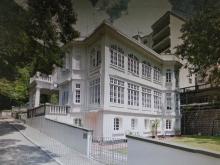Details from AMO's Historic Building Appraisal, #473:
Historic Building Appraisal
Alberose
Nos. 132A & 132B Pok Fu Lam Road, Hong Kong
Historical Interest
The “Alberose” (玫瑰村) in Nos. 132A & 132B Pok Fu Lam Road was built in 1926 as a private residence. It was owned by Mrs. Rosie Weill who was the Senate Fearers of the Hong Kong Hotel Buildings. After its completion, the building was the residence of Mrs. Rosie Weill and her husband Albert Weill.
After the death of Mrs. Weill in 1952, the ownership of the site was transferred to Hong Kong University (HKU) in 1955 and then used ever since as staff quarters of the University. In 1958 two semi-detached houses on site, which were erected after the completion of the existing “Alberose”, were demolished to make way for a new, taller house. W.G. Gregory, then Dean of the HKU Faculty of Architecture, was the architect responsible for the new house. The original flower gardens and tennis court were also cleared; however, the pre-World War II “Alberose” is preserved in-situ.
Architectural Merit, Rarity, Built Heritage Value & Authenticity
Architecturally, the house has been described as Classical Revival of Neo-Georgian style. Whilst the house does exhibit some classical architectural elements such as Tuscan columns to the entrance porch, the asymmetrical plan, transomed windows glazing bar pattern, canted bay and Tudor style corner tower suggest some other architectural influence at work such as the Beaux Arts school. In fact, the house is rather an eclectic mix of styles, more French than English. Other architectural features include moulded cornices, decorative apron panels under windows, louvred shutters and ornamental balustrading. The structure is believed to be load-bearing brick walls with reinforced concrete beams, floor slabs and lintels. Although some minor alterations appear to have been carried out such as enclosure of the verandahs, the house retains much of its authenticity and therefore has built heritage value.
Social Value & local interest
The social value of the house lies in its reflection of the upper class Western community life style in the pre–WW2 period. The Pokfulam Road area is mainly low density residential including a few buildings of pre-modern style. Old Alberose therefore is of local interest contributing to the character and history of the area.
Group Value
The building is physically close to a number of historic buildings including the Douglas Castle 德格拉斯堡 (the present University Hall, which is a Declared Monument) in No. 144 Pok Fu Lam Road, the “Bethanie” 伯達尼修院 in No. 139 Pok Fu Lam Road and the “Jessville” at No. 128 Pok Fu Lam Road.
Adaptive Re-use
Since the house is still in use as a residence and will probably continue to be used as such for some time to come the question of adaptive re-use does not arise at present.

Comments
Alberose 132 Pok Fu Lam Road
Dear David,
What a nice piece of excellent and thorough article written.
Thanks for your tremendous efforts.
Have u ever sent a letter to any heritage owners to see if they can let u visit the interior of a heritage?
i have thought of doing so for Alberose.
take care...
alex
Alberose
Hi Alex,
I cannot take any credit for the article, it was written by the Antiquities & Monuments Office (AMO) in their "Historic Building Appraisal" document.
I haven't tried writing to the owners of any of the old heritage buildings in Hong Kong. If you are able to visit any, please share some photos and stories with us.
Best regards, David
Alberose 132 Pok Fu Lam Road. 10 Borrett Road
Sure David.
In past 2 weeks I had 2 site visits at 10 Borrett Road (the fascinating red-brick buildings being occupied by different NGOs)
Today, I searched through wiki and your webpage about the buildings. Found out that the buildings were previously Bowen Military Hospital, so scary …
Take care,
Alex
Origin of Alberose
"They had a sumptuous home, with furnishings in exquisite taste, their servants had remained with them throughout (the war) ...
https://books.google.com/books?id=nw1bTZV4BaAC&lpg=PA62&ots=r4YVK0yn93&…
Corrections
The AMO's report begins:
The “Alberose” (玫瑰村) in Nos. 132A & 132B Pok Fu Lam Road was built in 1926 as a private residence. It was owned by Mrs. Rosie Weill who was the Senate Fearers of the Hong Kong Hotel Buildings. After its completion, the building was the residence of Mrs. Rosie Weill and her husband Albert Weill.
I think the section "Mrs. Rosie Weill who was the Senate Fearers of the Hong Kong Hotel Buildings." actually refers to the Sennet Freres jewellery shop, which was located in the Hong Kong Hotel building. Moddsey notes that "The Weill family owned the Sennet Freres jewellery store."
Also Albert Weill died in 1922, so if Alberose was completed in 1926 it was never his residence.
I'll send a note to the AMO to let them know.
1947 Alberose
Noted in the China Mail dated 1 April 1947 that Alberose was being used as quarters for the V. A. D. probably due to its proximity to Queen Mary Hospital.